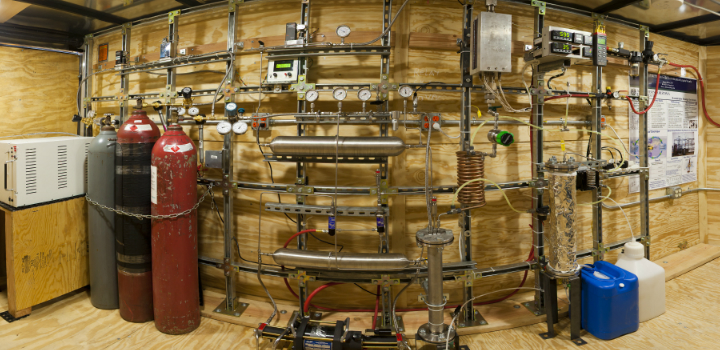Most viewed
- About NAU energy research
- Bicycle generator project
- 2015 Arizona wind & solar status report
- Education
- Energy experts
- Energy research
- Four Corners Wind Resource Center
- 2013 Arizona wind & solar status report
- Interactive Arizona wind map
Recent reports
- 2015 Arizona wind & solar status report
- 2013 Arizona wind & solar status report
- "The Future of Electricity: Embracing Transition"
- Prescott Airport solar facility & variability study
- Integration of Wind and Hydropower Systems: Issues, Impacts and Economics. Vol. 1
- Integration of Wind and Hydropower Systems: Case Studies. Vol. 2
Synthetic fuels
Methanol synthesis Accordion Closed
NAU Researcher Dr. Eric Morgan has been working with private industry and military partners to develop a mobile synthetic fuels manufacturing unit that makes methanol from hydrogen and CO2. The manufacturing unit is located inside of a trailer for easy mobility. Liquid fuel synthesis using renewable energy and carbon dioxide has potential climate change mitigation, energy management, and military mobility/reliability impacts.
Methanol Accordion Closed
Methanol (CH3OH) is the simplest alcohol, consisting of one carbon, one oxygen and four hydrogen atoms. At room temperature it is a colorless liquid that is less dense than water, making it a good solvent and fuel. In fact, methanol is used in some race cars as a high-octane, premium fuel. It is also a drop-in replacement for ethanol in gasoline, or gasoline itself. NAU has developed a methanol synthesis reactor that directly converts carbon dioxide (CO2) and hydrogen (H2) into methanol and water. The reactor operates entirely on electricity and includes a high-pressure electrolyzer to obtain gaseous hydrogen directly from purified water. The entire methanol reactor assembly was installed in a mobile trailer so that methanol can be made where “free” streams of carbon dioxide exist: breweries, power plants, and wastewater facilities. The trailer includes a distillation unit that separates the methanol and water mixture on site so that the synthesized water can be reused in the electrolyzer. The pure methanol can then be used as a fuel, or stored and sold offsite.
Check out NAU researchers’ featured article in the Daily Sun and learn more in the video below.
